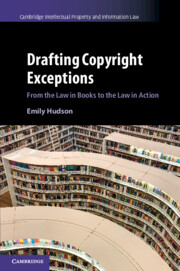
-
Select format
-
- Publisher:
- Cambridge University Press
- Publication date:
- 31 March 2020
- 02 April 2020
- ISBN:
- 9781107338012
- 9781107043312
- 9781107618541
- Dimensions:
- (228 x 152 mm)
- Weight & Pages:
- 0.7kg, 410 Pages
- Dimensions:
- (229 x 152 mm)
- Weight & Pages:
- 0.547kg, 410 Pages
- Series:
- Cambridge Intellectual Property and Information Law (51)
- Subjects:
- Intellectual Property, Law, Comparative Law, International Trade Law
You may already have access via personal or institutional login- Series:
- Cambridge Intellectual Property and Information Law (51)
- Subjects:
- Intellectual Property, Law, Comparative Law, International Trade Law
Book description
How should copyright exceptions be drafted? This is a question of ongoing concern in scholarly and law reform debates. In Drafting Copyright Exceptions, Emily Hudson assesses drafting options using insights from the standards and rules literature, and case studies from cultural institutions in Australia, Canada, the UK and the US. Drawing on thousands of hours of fieldwork conducted over fourteen years, the book describes how staff engage with and interpret the law. Whilst some practices are guided strongly by copyright doctrine, others are influenced by the factors such as ethical views, risk assessment, and prosaic matters related to collection management. This work should be read by anyone interested in a detailed account of interpretative practices related to the drafting of copyright exceptions, but it also speaks to broader debates about the relationship between the 'law in books' and the 'law in action'.
Reviews
'Drafting Copyright Exceptions is, without doubt, an important study not just for scholars and practitioners of intellectual property, but also judges, policy-makers and copyright users and their representative organizations.'
Elena Cooper Source: Edward Elgar Publishing Ltd
Contents
Metrics
Altmetric attention score
Full text views
Full text views help Loading metrics...
Loading metrics...
* Views captured on Cambridge Core between #date#. This data will be updated every 24 hours.
Usage data cannot currently be displayed.
Accessibility standard: Unknown
Why this information is here
This section outlines the accessibility features of this content - including support for screen readers, full keyboard navigation and high-contrast display options. This may not be relevant for you.
Accessibility Information
Accessibility compliance for the PDF of this book is currently unknown and may be updated in the future.


